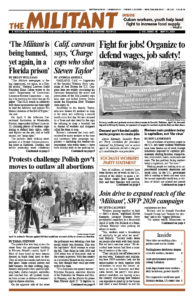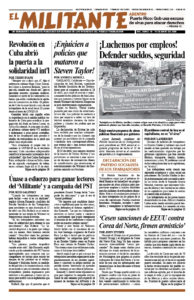May 15, 1995
More than 20,000 Cubans detained in concentration camps at the U.S. Naval base in Guantánamo, Cuba, will be allowed entry into the United States under an agreement recently signed between Washington and Havana.
From the beginning the camps were a powder keg. Less than three weeks after the internments began, 650 Cubans began throwing rocks at U.S. soldiers after a dispute during a soccer game.
Cuban newspaper Granma International noted that the Cuban prisoners “know what social justice and dignity are, and they are not going to tolerate abuses that they haven’t experienced in Cuba in the last 35 years.”
The prison camps were set up during the “rafters crisis,” which was provoked by U.S. government policy toward Cuba last summer. Following boat hijackings by people wishing to emigrate to the United States, the Cuban government announced last August that it would not attempt to stop anyone from leaving.
May 15, 1970
Allison Krause, Sandra Lee Scheuer, Jeffrey Glenn Miller and William E. Schroeder are dead. [President Richard] Nixon and his cohorts have created the kind of atmosphere where a National Guard commander can order his men to fire into an unarmed assemblage.
The four Kent [State] students fell victim to the same violence being directed against the people of Indochina.
The Nixon administration and the imperialist system it represents are determined to maintain their domination of Southeast Asia — no matter the cost in lives of Vietnamese. And they are entirely capable of attempting the same kind of cold-blooded violence against those in this country who raise their voices to say, “No! Stop it!”
May 30, Memorial Day, must be a day of unprecedented street mobilizations. This will honor the memory of the four martyrs of the Kent State massacre.
May 12, 1945
[After the liberation of] Buchenwald, one of the worst [Nazi] camps, the 15,000 prisoners organized an inspiring celebration of May Day.
Many of these men have been in Fascist jails or camps for 10 years or more. They are the proletariat of many nations and they are magnificent. This is their day and it is fitting that they should have celebrated it here. On the walls of the barracks, great signs in German, English, Russian, Polish, Czech and Serbian read: “This is the Day of the Fight against Fascism.”
Between these signs and beneath the flags of many nations, the survivors marched — a Polish group, a Russian group, a Yugoslav group, a Czechoslovakian group, an Italian group, a Spanish group, and many others. Then came a large German unit and they began singing the Internationale. Other groups picked up the song, each in its own language. The melody rose in a mighty torrent into thin air which but one month ago still stank of Nazi massacres.

